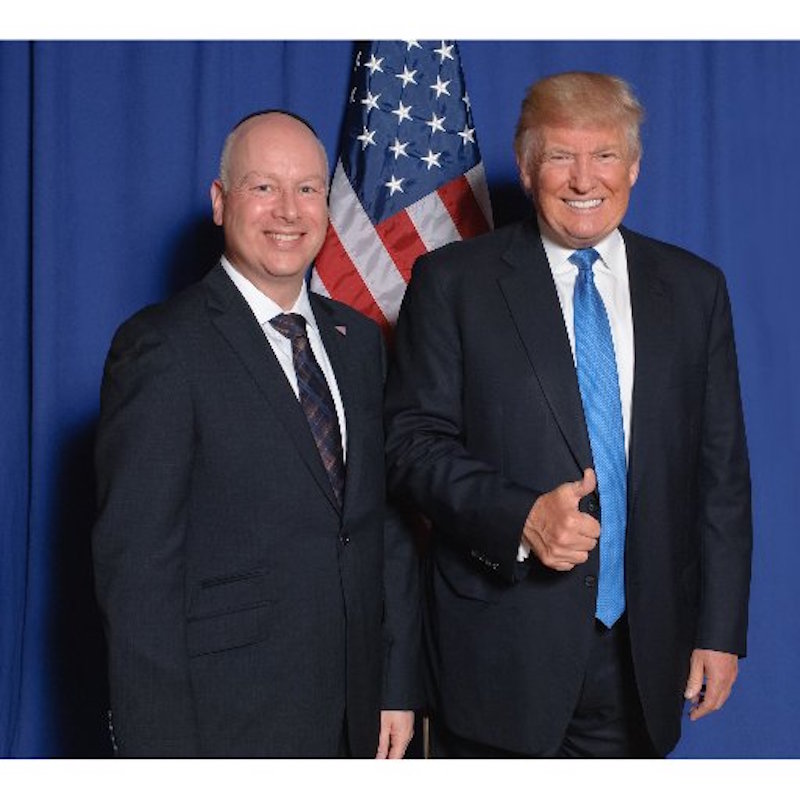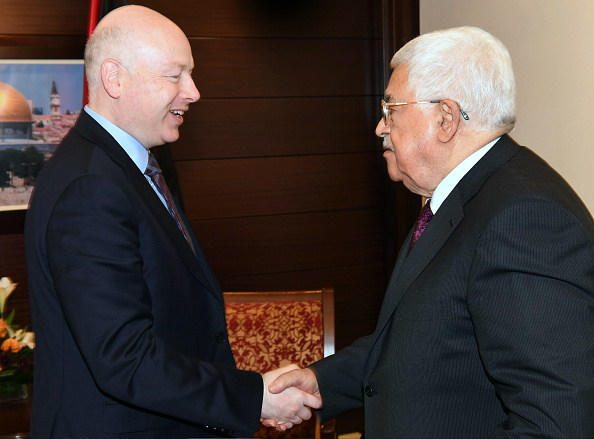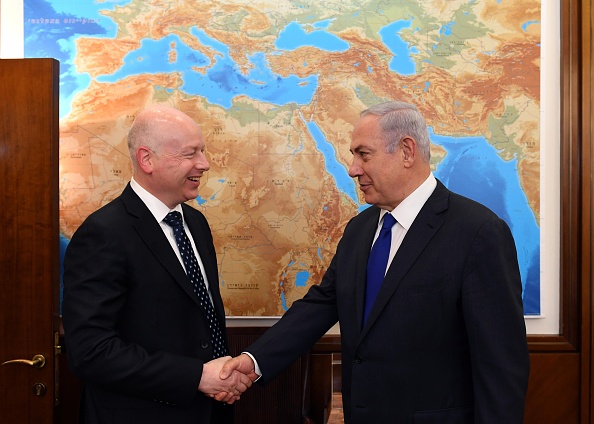-The Arab Peace Initiative was a good effort for its time, while our plan is grounded in the logic and realities of 2019.
-Solving the Palestinian-Israeli conflict will move the region forward, but the threat of Hezbollah and tragedies of Syria and Yemen need their own solutions.
Jason Greenblatt serves the White House as Assistant to President Donald J. Trump and Special Representative for International Negotiations. A lawyer by trade and son of Jewish refugees from Nazi-occupied Europe, he has worked for Mr. Trump for the past 22 years. Previous posts included executive vice president and chief legal officer to the Trump Organization. Greenblatt is presently one of only four administration officials with access to the President’s Middle East peace plan.
In Greenblatt’s exclusive interview with Majalla — his first in any Arabic-language publication — he responded to preemptive criticism of the plan and shared some of its underlying principles. He addressed its relationship with prior peace efforts, including the “Arab Peace Initiative,” and situated the plan and its prospects in the broader context of the struggle to achieve security and prosperity across the region.
Q: What do you say to those in the region who do not support your plan or peace efforts?
A: It would be the rare person who doesn’t seek peace. So everyone should support the peace effort itself, unless they are against peace or against improving Palestinian lives. As to the plan, at this point, no one can honestly say they are against the plan because they haven’t seen it. There are those who might not like our current policies, and we understand that. But that does not mean they can then honestly say they are against the plan which they have not yet seen. We’ve asked everyone to continue being patient and to not prejudge the plan. We believe we have developed a plan that is detailed, realistic, fair and implementable; one that will enable people to live better lives. Once everyone sees the plan, they’ll understand why it has taken us this long to release it. We do hope everyone will keep an open mind so that there can be a meaningful dialogue once the plan is released.
Q: The Palestinian authority refuses to meet with you and has said that it will not even consider your plan. What will you do if that is the case?
A: It’s difficult to understand why the Palestinian Authority would refuse a plan they haven’t seen. Palestinians deserve dignity, opportunity, and a better way of life. Once they have had an opportunity to read and digest our plan, people should ask themselves: will this plan make the lives of Palestinians and Israelis better? And we think that it will. So, when the time comes, our hope is that the Palestinian Authority will act professionally, give the plan a serious look, judge it on its merits, and engage constructively on it. All Palestinians, in both the West Bank and Gaza, deserve nothing less. I believe that history will judge the Palestinian Authority harshly for passing up an opportunity that could give the Palestinians something so very different, and something so very positive, compared to what they have today.

Q: In past media statements you’ve said that the Palestinian leadership is holding on to old traditions and previous, failed initiatives. Is this the right time to launch a peace plan with Abbas, who himself is the contemporary and heir of those same traditions? Do you believe that younger leaders in the region have a better understanding of developments?
A: There will never be a perfect time to try to make peace, but the status quo does not work for anyone – people are suffering; the region is suffering. We hope that the leadership will be able to put down their calcified talking points long enough to read through and consider our plan. We also hope the people will be able to read our plan and discuss its many positive elements. In the last two years, after much discussion with ordinary Palestinians, we have found that the people, particularly the youth, are tired of this conflict. More and more, they are looking forw
ard toward what they hope is a brighter future. Ultimately, we believe this plan will be the most exciting and comprehensive opportunity they’ve encountered in their lifetimes, if they choose to pursue it. The alternative will just be more false promises and mere political statements which do nothing to help Palestinians. As for the regional leaders, I have respect for many of the leaders in the region and I can see how many of them want to try to move forward as well. I think many of them are putting their own people and national interests at the top of their agenda, which is important. The demographics of some of these countries skews very young, and these leaders recognize the need to take care of their own populations. We are here to work with them on that endeavor. We do want to help Palestinians, but we also want to work with the region to allow them to succeed with their own populations as well.
Q: Is your peace plan an "economic peace," as some have said?
A: This is not an economic peace. The plan suggests what we think is the best and most realistic way to resolve all of the core issues. But we also believe the economic portion of the plan is of vital importance. In order to have a sustainable peace, we believe Palestinians must be given significantly better opportunities and a better way of life. Our economic plan will provide this. But the economic vision we present cannot exist without the political component, nor can the political component succeed without the economic component. The two support and complement each other. Together, our comprehensive plan could create the first real opportunity for the brightest future Palestinians have ever had.
Q: Does your plan take into account the “Arab Peace Initiative?” Is it the basis of your plan?
A: From the beginning of this process we’ve looked at past efforts and have tried to learn from them. Many smart and talented people have worked on this file over many years. Our approach has been to acknowledge realities and focus on speaking truth. Our plan is grounded in the logic and realities of 2019. The Arab Peace Initiative was a good effort for its time. I remember reading it many years ago and was very inspired for the possibilities that it held. But the Arab Peace Initiative was also short on details so we really cannot compare the two. We have decided to develop the ideas and solutions more deeply so that everyone can truly understand the many benefits they can achieve if they proceed with our plan, as well as the compromises needed to reach peace. We are under no illusions of the challenges we face in what many consider to be one of the hardest problems to solve in modern times.
Q: Have you sought out input and advice from Arab leaders in the region? And if so, can you share a sense of any input which you found worthwhile and have seen fit to embrace?
A: Over the course of the last two years, we have had many discussions with leaders in the region for insight and perspective and have heard what they have to say on the issues. We look forward to a constructive dialogue with regional leaders on the specifics of the plan once it is released. There are many talented leaders in the region and their input has been important.

Q: It appears that, by contrast to previous peace efforts where parties negotiated privately toward a plan, you will present a plan and then hope the parties can negotiate. Can you explain why you have taken this approach?
A: We decided to do things differently. We decided that it was important to develop the details more thoroughly so there would be no doubt about what the parties were negotiating. But it is important to remember that ultimately it is up to the parties themselves to come to an agreement. No other country or international organization can force a peace agreement on the parties. They have to be willing to work together to reach this deal.
Q: Don’t the Jerusalem and Golan decisions prejudge what the plan holds for Palestinians?
A: First of all, the Golan decision is not related to the Israeli-Palestinian conflict. In any event, these decisions were just a recognition of reality. We believe that it was important to start from a place of truth, and that includes being honest about our recognition of Jerusalem as Israel’s capital – it was the capital of the Jews in ancient times, and it has been the capital of Israel since the formation of the State of Israel. Pretending otherwise only undermines the chances of peace. There is no world in which Jerusalem would not be the capital of the State of Israel. As far as the Golan Heights – who could suggest that Israel give up the Golan Heights, an area of very strategic importance, which was used to attack Israel over and over again, and give it to a man who committed mass atrocities and who barrel bombed women and children in his own country? If leaders reflexively fall back on old talking points and positions, we’ll never have more than the status quo. Our plan is based on the current realities on the ground and we believe it offers an unquestionably better way of life for Palestinians. We are prepared for rational, logical criticism of the plan from all sides, but people should not use our policy positions to disregard our plan. How does that help Palestinians? Those who truly care about Palestinians should encourage Palestinians to read the plan and engage on the plan. That is the only way they have a chance at a good future. Disregarding the plan, or condemning the plan just hurts Palestinians. Speculating and condemning a plan that has yet to be released does nothing to advance peace.

ََQ: How do your peace efforts fit in the context of other issues facing the region?
A: Traditionally, many refer to the resolution of the Israeli-Palestinian conflict as the “Middle East Peace Process.” That name is a misnomer. The Israeli-Palestinian conflict is just one of the conflicts in the region, and solving it will not put an end to other conflicts such as the tragic civil war in Syria, war in Yemen, Hezbollah (a terrorist organization sponsored by Iran) in Lebanon, instability in Libya, terrorists in the Sinai Desert in Egypt and an Iranian regime that oppresses its own people and foments terrorism around the world. That said, ending the Israeli-Palestinian conflict will allow some of the region to move forward and potentially lead to greater cooperation and economic opportunity among the people of the region. There is a lot of untapped potential that a peace agreement could unleash and help nurture. But it will not resolve the problems of the region.







